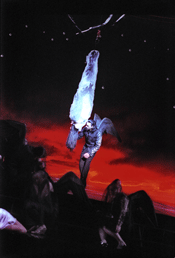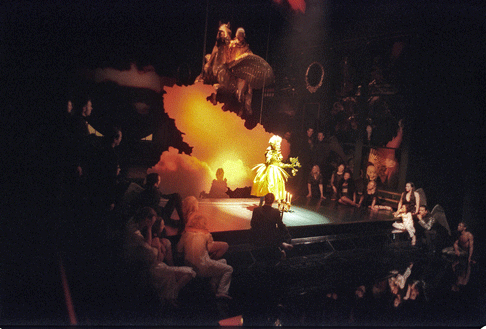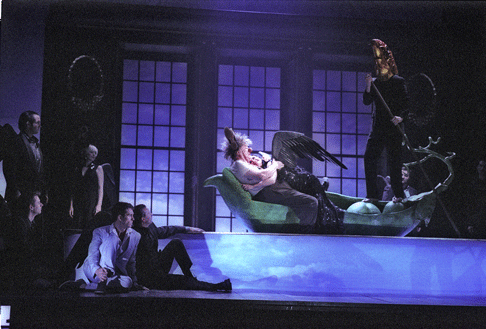The estate itself is magnificent, but Glyndebourne is distinctive because it’s dedicated to excellence. Christie’s vision was to create “not the best we can do, but the best that can be done anywhere”. Glyndebourne is like Bayreuth, but with wider range.
Celebrating Glyndebourne’s anniversary with The Fairy Queen was a masterstroke, honouring Shakespeare and Henry Purcell, born 350 years ago. This production, conducted by William Christie (no relation to John), conducted by Jonathan Kent and designed by Paul Brown is spectacular in every sense. For Purcell and his contemporaries, opera was meant to be spectacle, to astound audiences with its inventiveness and wit. In the current economic climate, this glorious production may seem extravagant. But baroque is a statement of faith in the power of art to transcend grim reality.
Baroque taste was inspired by the exotic, by the possibilities offered by new worlds “discovered” in Asia, South America and Africa. Thus the first scene, in a conventional 18th century drawing room, cabinets filled with porcelain and a tree of crimson coral. But The Fairy Queen is based loosely on A Midsummer’s Night’s Dream, where, in the darkness of night, fairies rule, and the realm of dreams finds release. Bizarre as it may seem, baroque sensibilities bore fruit in Romanticism and in 20th century ideas about the subconscious.
 Sally Dexter as Titania and Joseph Millson as Oberon
Sally Dexter as Titania and Joseph Millson as Oberon
Oberon and Titania (Joseph Millson and Sally Dexter), and their minions are fairies with attitude, sporting sinister wings like ravens, and black costumes, part evening dress, part bondage gear. They tumble out of the cabinets, invading the rational world. Even Titania isn’t safe : Oberon’s magic potion goes awry, so she falls in love with Bottom, transfigured as an ass.
Shakespeare’s play within a play lends itself superbly to Purcell’s concept of opera as a combination of different forms of theatre — song, masques for dancing, orchestral fantasies, tracts of spoken dialogue and dramatic tableaux. Towards the end, stage overflows into auditorium, players running in through the stalls. William Christie turns to the audience, encouraging them to sing along. At the very end, rose petals fall from the ceiling, engulfing the patrons, a final coup de théâtre which evokes Glyndebourne’s lovely gardens beyond the building.
The workmen-actors enter the drawing room with cleaning tools. Their very bumptiousness is a subversive send up of the bewigged formality with which the tale begins. The play they create, complete with talking wall and cowardly lion is an anarchic parody of theatre, which is itself an illusion of ordinary life. At the performance I attended, Robert Burt who plays Flute who plays Thisbe tore a ligament in one scene, coming on later with a splint and walking stick. It was a wonderful moment where practical reality merged, yet again, into art.
In dreams, symbols hold sway. Literally, in the scene where Titania is wrapped in shrouds of muslin as she falls into deep sleep. Then a giant spider descends from the ceiling, sweeping the queen upwards like prey, suspended dangerously above the stage. It’s a shockingly potent image, dangerous and breathtaking — if the spiders thread should break, the singer might indeed be killed. A giant opium poppy appears alluding to unnatural dreams and again to the implication of danger and death. Titania and Bottom, played by Desmond Barrit, his head now an ass, float away in a boat shaped like a giant pea pod which emerged from the bowels beneath the stage. As if crossing the River Styx, they are ferried by a gondolier with the head of a fish.
 Autumn
Autumn
Purcell’s drama was influenced by the exigencies of his time. Thus the baroque taste for elaborate theatrical illusions, which this production faithfully honors with the extra benefit of modern technology and lighting. The roof opens as huge wooden cut outs of clouds descend. The clouds part to reveal a resplendent Sun King astride a golden Pegasus, wings unfurled. Then, vignettes of each of the Four Seasons. Autumn comes dressed as cabbage and pumpkin, like those paintings of men as vegetables, so popular in baroque times. These tableaux don’t serve the narrative as such, they’re pure spectacle, in true 17th century spirit.
Adam and Eve appear, naked but for well-placed fig leaves under the canopy of a huge golden apple tree. Baroque audiences liked a bit of titillation, but would have understood the Biblical allusion. Eve flirts about and Adam eats an apple, after which the fairies throw them clothing from the wings. Finally the lovers are married - in the right combinations — and there’s a masque where the god of Marriage, Hymen (Andrew Foster-Williams) appears proffering the joys of wedded bliss. Perhaps baroque audiences related to marriage as a symbol of social stability, as opposed to the anarchy of nocturnal mayhem, portrayed earlier in the opera by giant bunnies copulating in myriad ways. Certainly ribaldry runs throughout this opera and even Shakespeare as bard was bawdy.
 In peapod boat : Desmond Barrit as Bottom and Sally Dexter as Titania
In peapod boat : Desmond Barrit as Bottom and Sally Dexter as Titania
William Christie led the Orchestra of the Age of Enlightenment in free spirited, vivacious performance. This is the best baroque orchestra in England, so it was wonderful to hear them conducted by Christie, who is usually based in France. Very good singing, too. So many songs and ensembles flow in rapid succession that perhaps it’s better not to single out a few from the overall god work. Lovely dancing, too, and a delightfully athletic Puck (Jotham Annan).
This was an amazing Fairy Queen, which will be almost impossible to translate in the semi-staged performance to come at the Proms in London this summer. Nor will it work in theatres outside Glyndebourne which don’t have its superb facilities, so it won’t be included in the Glyndebourne Touring season. Let’s pray this production will be immortalized on film, so all can share in its glory.
Anne Ozorio
The Fairy Queen runs at Glyndebourne until 8th August 2009. This season at Glyndebourne includes Falstaff, Guilio Cesare, L’Elisir d’amore, Rusalka, Jenůfa, Tristan und Isolde and Così fan tutte. After the summer season, Glyndebourne Touring Opera can be heard in other cities in the United Kingdom. This production can also be heard in semi staged performance at the BBC Proms in London on 19th July 2009 , and will be broadcast internationally and online.
For more information please see the Glyndebourne website.
![Sally Dexter (Titania) [Photo by Neil Libbert courtesy of The Glyndebourne Festival]](http://www.operatoday.com/Dexter_Titania_GFO.gif)


